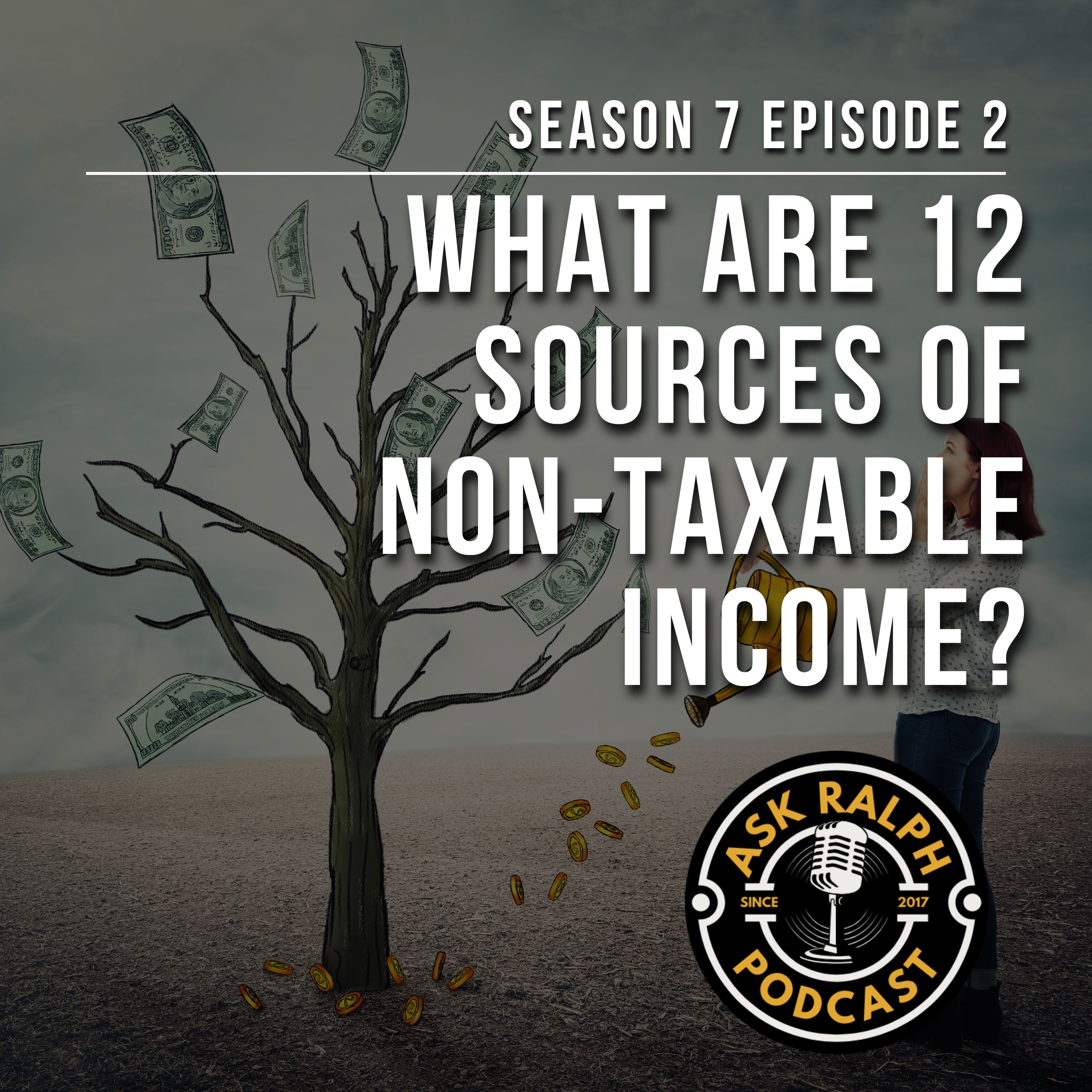How Can Non-Taxable Income Help You Save Money Legally?

12 Sources of Non-Taxable Income
When it comes to personal finances, understanding the difference between taxable and non-taxable income is crucial for maximizing your financial well-being. While most forms of income are subject to taxation, certain types of income are exempt from federal and sometimes state taxes. Knowing Which Types of Non-Taxable Income Can Help You Save Money Legally allows you to make informed financial decisions and potentially reduce your tax burden.
Check Out The Full Podcast Episode:
This comprehensive guide explores 12 sources of non-taxable income, providing detailed explanations, limitations, and relevant links for further reading. Whether you're planning for retirement, managing investments, or simply seeking to optimize your tax strategy, this article will equip you with the knowledge to navigate the complexities of non-taxable income.
What is Non-Taxable Income?
Non-taxable income, often called tax-exempt income, includes specific earnings and benefits not subject to federal income tax. These sources are generally not reported on your tax return 1. Examples include various forms of government assistance, certain employer-provided benefits, and income from specific types of investments 2.
12 Sources of Non-Taxable Income
1. Disability Insurance Payments
If you have a disability that prevents you from working, you may be eligible to receive disability insurance payments. These payments are generally non-taxable if you paid the premiums with after-tax dollars 3. However, if your employer paid for the disability insurance policy, the benefits may be considered taxable income 3.
There are various types of disability insurance, each with its own set of rules and regulations. Social Security Disability Insurance (SSDI), a federal program, provides monthly payments to individuals with disabilities that limit their ability to work 4. Supplemental Security Income (SSI) payments, which provide assistance to those with limited income and resources, are also tax-exempt 5. Additionally, disability compensation or pension payments from the Department of Veterans Affairs to U.S. military veterans are tax-free 5.
2. Employer-Provided Insurance
Many employer-provided insurance benefits are non-taxable, including:
- Health Insurance: Most employer-sponsored health insurance plans, including health reimbursement arrangements (HRAs) and long-term care insurance, are not taxable 3. Reimbursements for medical expenses due to injury or illness under an accident and health insurance contract are also generally non-taxable 5.
- Life Insurance: Employees generally do not pay tax on up to $50,000 of group term life insurance coverage provided by their employer 3.
3. Health Savings Accounts (HSAs)
Health Savings Accounts (HSAs) are tax-advantaged savings accounts that allow you to set aside money on a pre-tax basis to pay for qualified medical expenses 6. To be eligible for an HSA, you must be enrolled in a high-deductible health plan (HDHP) 7. Contributions, earnings, and withdrawals for qualified medical expenses are all tax-free 7. This "triple tax advantage" makes HSAs a powerful tool for managing healthcare costs, both now and in the future.
4. Life Insurance Payouts
Life insurance payouts, or death benefits, received by beneficiaries after the policyholder's death are generally tax-free 3. However, any interest earned on the proceeds may be taxable 5. It's important to note that if the policyholder takes a loan against their life insurance policy, the loan is generally not taxable as long as the policy remains in force and the loan amount doesn't exceed the premiums paid 5.
5. Annuities
Annuities, which are contracts with insurance companies that provide a stream of income, have varying tax treatments depending on the type of annuity. Generally, you pay taxes on annuities only when you start receiving payments or withdrawing funds 5. For example, earnings from non-qualified annuities are taxed upon withdrawal, while contributions made with after-tax dollars are not taxed.
6. Earned Income in Certain States
Seven states do not have individual income taxes: Alaska, Florida, Nevada, South Dakota, Tennessee, Texas, and Wyoming 3. If you live in one of these states, your earned income is not subject to state income tax. However, it's essential to be aware of other state-specific taxes that may apply. For example, Washington State has a capital gains tax, and New Hampshire is phasing out its interest and dividend income tax 5.
7. Corporate Income in Certain States
Six states do not have corporate income taxes: Nevada, Ohio, Texas, South Dakota, Washington, and Wyoming 3. If your corporation operates in one of these states, its income is not subject to state corporate income tax.
8. Sale of a Principal Residence
If you meet certain ownership and use requirements, you can exclude up to $250,000 (or $500,000 for married couples filing jointly) of capital gains from the sale of your primary residence 3. To qualify, you must have owned and lived in the home for at least two of the five years before the sale 3. This exclusion can be a significant tax benefit for homeowners.
9. Financial Gifts
Financial gifts received from friends or family are generally not considered taxable income 3. However, if the gift generates income (e.g., interest), you may owe federal tax on that income 8. The annual gift tax exclusion for 2024 is $18,000 per recipient or $36,000 for married couples 9. This means you can give up to this amount to any individual without incurring gift tax liability.
10. Inheritances
Inheritances, including cash, property, and investments, are not considered taxable income by the IRS 5. However, some states may impose inheritance taxes 5. Careful estate planning can help minimize potential estate taxes and ensure that assets are distributed according to your wishes.
11. Municipal Bond Interest
Interest earned on municipal bonds is generally tax-free at the federal level 10. It may also be exempt from state and local taxes if you live in the state where the bond was issued 10. This tax advantage can make municipal bonds an attractive investment option, especially for those in higher tax brackets. However, it's important to remember that U.S. Treasury securities are taxable at the federal level, and corporate bond interest is taxable at both the federal and state levels 5.
12. Income Offset by Capital Losses
If you sell investments at a loss, you can use the capital loss to offset capital gains and reduce your taxable income by up to $3,000 per year 3. If your capital losses exceed your capital gains, the IRS allows you to carry the loss forward to later years to offset future gains 5.
13. Child Support Payments
Child support payments received are not considered taxable income 1. This helps ensure that the funds support the child's well-being.
14. Welfare Payments
Welfare payments provide financial assistance to individuals and families in need and are non-taxable 1.
15. Cash Rebates
Cash rebates received on items you purchase from a retailer, manufacturer, or dealer are considered non-taxable income 1.
16. Adoption Assistance
Money reimbursed from qualifying adoptions is non-taxable 1. This can help alleviate the financial burden associated with adoption.
17. Scholarships
Money from a qualified scholarship is not taxable if used for qualified educational expenses, such as tuition and fees 1. However, if you use the scholarship money for room and board or other personal expenses, that portion is generally taxable 1.
18. Alimony Payments
Alimony payments are non-taxable for divorce decrees finalized after 2018 1. However, it's important to note that state tax treatment of alimony may differ 5.
19. Social Security Benefits
While some portion of your Social Security payments may be subject to federal tax, most states do not tax Social Security income 5.
Conclusion
Understanding the various sources of non-taxable income is essential for sound financial planning. By strategically utilizing these sources, you can reduce your tax liability and enhance your overall economic well-being. To learn more about specific non-taxable income sources and how they might apply to your situation, explore online resources or consult a financial advisor for personalized guidance.
Works cited
- Taxable Income Nontaxable Income: What You Should Know ..., accessed December 14, 2024, https://turbotax.intuit.com/tax-tips/irs-tax-return/taxable-income-vs-nontaxable-income-what-you- should-know/L0h4j5DZQ
- 12 Types of Non Taxable Income You Can Write Off - Steward Ingram & Cooper PLLC, accessed December 14, 2024, https://stewardingram.com/what-is-non-taxable-income/
- 12 Top Sources of Nontaxable Income - Investopedia, accessed December 14, 2024, https://www.investopedia.com/taxes/sources-nontaxable-income/
- Disability | SSA, accessed December 14, 2024, https://www.ssa.gov/disability
- Types of Income the IRS Doesn't Tax | Kiplinger, accessed December 14, 2024, https://www.kiplinger.com/taxes/types-of-nontaxable-income
- Health Savings Accounts | FDIC.gov, accessed December 14, 2024, https://www.fdic.gov/consumer-resource-center/2024-09/health-savings-accounts
- Health Savings Account (HSA): How HSAs Work, Contribution Rules - Investopedia, accessed December 14, 2024, https://www.investopedia.com/terms/h/hsa.asp
- What Counts as Nontaxable Income on Your IRS Tax Return? - Golden Apple Agency, accessed December 14, 2024, https://www.goldenappleagencyinc.com/blog/what-counts-as-non-taxable-income
- Financial Gifts to Children and Family Members | Morgan Stanley, accessed December 14, 2024, https://www.morganstanley.com/articles/financial-gifts-kids-family-members
- Municipal Bonds | Investor.gov, accessed December 14, 2024, https://www.investor.gov/introduction-investing/investing-basics/investment-products/bonds-or-fi xed-income-products-0












